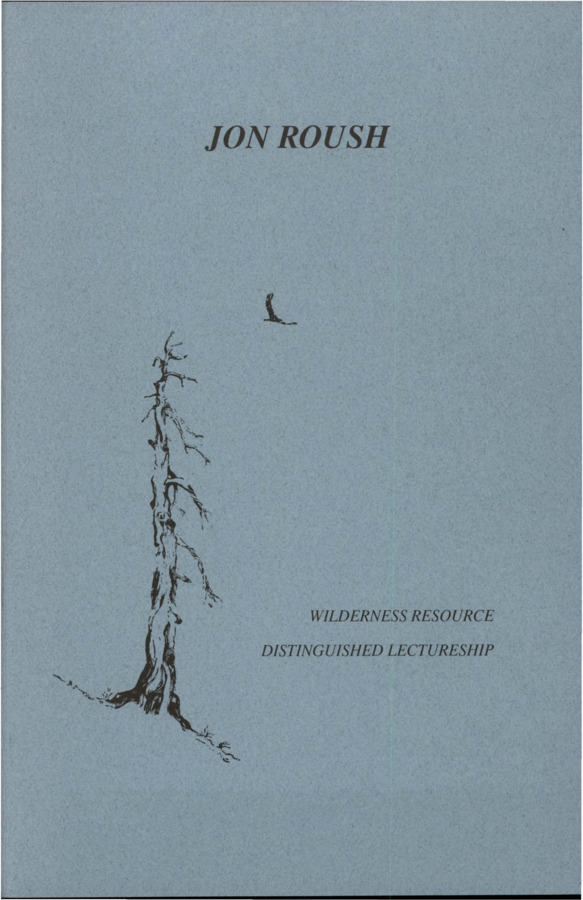PDF
A Vision for Wilderness in the Nation Item Info
- Title:
- A Vision for Wilderness in the Nation
- Creator:
- Jon Roush
- Date Created (ISO Standard):
- 1995-02-27
- Description:
- Lecture given by Jon Roush, president of the Wilderness Society. Opening remarks given by James R. Fazio, professor in the Department of Resource Recreation and Tourism, College of Foretry, Wildlife and Range Sciences. Introduction given by John C. Hendee director of the University of Idaho Wilderness Research Center. The lecture opens discussing the previous lectures in the series and how this lecture will differ from the rest. The lecture will detail the threats to wilderness and what can be done to stop them. The lecture clarifies that a threat against wilderness is a threat against wilderness values and then asks the question why we have those values in the first place. We value wilderness for diversity, immediate utility, spirituality (spiritual healing), 'land ethic' because it is ethical to value and protect it. The biggest threat that the lecturer focuses on is population growth. The exponential rate at which the world's population is growing is highlighted. The fact that earth's resources are finite is addressed, in particular food and water resources. A discussion is made about the possibility of the U.S. declining their consumption and lowering their standard of living, but the lecturer says this isn't a solution, it's an inevitability. China is contrasted to our nation as a picture of what we could become, but not one we want to emulate. The consquences of a doubled population in the U.S. by 2020 are discussed. One of those consquences that is detailed in length is the incresed use of wilderness recreation areas, national parks and national forests. The other change that comes with an increasing population is unpredictable cultural change; shifts in perception, even what is right and wrong, regarding wilderness. 'Our wilderness system depends... on people's willingness to take the long view, to act responsibly toward future generations, and to give up some personal gain for the common good.' Two issues for safegaurding wilderness against this danger are explored: How to build an informed, diverse consituency for wilderness and how to confront population issues directly and openly. The lecture then turns to public land policy. A call is given to complete the federal wilderness system while there is still time, wilderness designation and land aquisition are also priorities. But the most crucial element is wilderness management. The National Wildlife Refuge System is used for many purposes other than being a refuge to wildlife, the purpose of these systems must be spelled out in the legislature and enforced. Agencies should combine forces to manage wilderness in tandem. Our goals for wilderness can no longer be economical, but rather ecological. Legislators cannot become lax about environmental regulations put on private land. Our actions and regulations now will affect the overpopulated generations of the future. A bibliography is included. A list of past lecturers and the titles of their lectures are listed.
- Subjects:
- lectures population growth wilderness areas land management wilderness
- Location:
- University of Idaho; Moscow, Idaho
- Idaho County:
- Latah County
- Latitude:
- 46.7293
- Longitude:
- -117.0125
- Publisher:
- University of Idaho Wilderness Research Center
- Source:
- University of Idaho Wilderness Research Center
- Source Identifier:
- wrdl15
- Type:
- Text
- Format:
- application/pdf
- Language:
- eng
Source
- Preferred Citation:
- "A Vision for Wilderness in the Nation", Idaho Forestry Research Collection, University of Idaho Library Digital Collections, https://www.lib.uidaho.edu/digital/forestryresearch/items/forestryresearch968.html
Rights
- Rights:
- In copyright, educational use permitted. Educational use includes non-commercial reproduction of text and images in materials for teaching and research purposes. For other contexts beyond fair use, including digital reproduction, please contact the University of Idaho Library Special Collections and Archives Department at libspec@uidaho.edu. The University of Idaho Library is not liable for any violations of the law by users.
- Standardized Rights:
- http://rightsstatements.org/vocab/InC-EDU/1.0/

